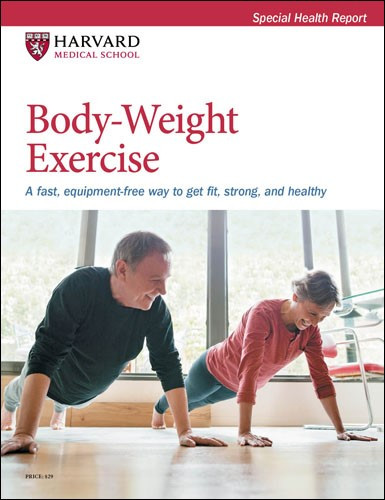The advantages of body-weight exercise

All exercise is beneficial. But even stacked up against other types of workouts, body-weight exercise has a lot to offer. Not only does it provide an excellent workout, but it can also help you overcome some common excuses for avoiding exercise, like "I don't have time to go to the gym" and "I don't have space for a stationary bike at home." All you have to do is move your body.
Here's a closer look at some of the pluses:
It couldn't be more convenient.
No matter where you are, you've got your body, so you can start exercising anywhere, anytime — in your bedroom when you wake up, in the kitchen while you're waiting for water to boil, in your hotel room when traveling. That makes it easy to find the time.
The price is right.
With body-weight exercise, there's nothing to buy other than a pair of shoes. You don't need stylish clothing. You don't even need a yoga mat, much less an expensive gym membership, although you can certainly do these workouts at the gym, too. You might want a few props, such as a chair, bench, or counter to modify some moves, but these are all items that you have on hand.
The intimidation factor is low.
You can do these exercises solo. You don't have to walk into a gym full of buff exercisers and complicated-looking weight machines that require adjustments and may still not fit you properly.
It's effective.
Research published in the journal Physiology and Behavior found that, as a form of resistance training, body-weight exercise helps build muscle "independent of an external load." But it does more than that. When researchers looked at the effects of 10 weeks of body-weight exercises on various physical fitness parameters in a small group of young women, they found improvements in seven out of nine of the parameters. The biggest gains were in aerobic capacity, with a 33% improvement. Muscle endurance, particularly in the core, increased by 11%, while lower-body power posted a 6% gain. Even flexibility was better after the training.
You don't necessarily have to do a lot of it.
While it's good to meet the Physical Activity Guidelines, smaller amounts of body-weight exercise can also deliver results. In a small study of active people in their 60s, Japanese researchers found that a workout consisting of eight simple lower-body exercises increased the participants' muscle strength and power by about 15% after 10 months. That may not sound like much, but during this stage of life, strength and power are often declining. What's more, the participants achieved these gains by doing only six workouts a month.
It provides functional exercise.
Most body-weight exercises work multiple muscles at once rather than training an isolated muscle or muscle group, as many exercise machines and dumbbell exercises do. Therefore, body-weight exercises are considered more functional, using more muscles and joints at a time, engaging balance, and mimicking everyday activities.
It can be adjusted to your fitness level.
It may not be obvious how to do this at first. When you're using your body as the weight, you can't just remove 10 or 20 pounds as you can with machines or dumbbells. But there are ways to modify moves to decrease or increase the resistance. You can adjust your body position — for example, doing push-ups against a wall rather than the floor — or you can change the number of times you repeat an exercise or modify the pace you're working at.
It's good for your health.
Literally thousands of studies have shown that the more you move, the lower your risks for heart disease, diabetes, obesity, multiple types of cancer, joint pain, and Alzheimer's disease. Exercise can also lift your mood, reduce your stress level, and improve your sleep. Body-weight exercise is no exception.
For more fast, equipment-free ways to get strong, fit and healthy, check out Body-Weight Exercise, a Special Health Report from Harvard Medical School.
Image: © Yagi-Studio/Getty Images
Disclaimer:
As a service to our readers, Harvard Health Publishing provides access to our library of archived content. Please note the date of last review or update on all articles.
No content on this site, regardless of date, should ever be used as a substitute for direct medical advice from your doctor or other qualified clinician.













